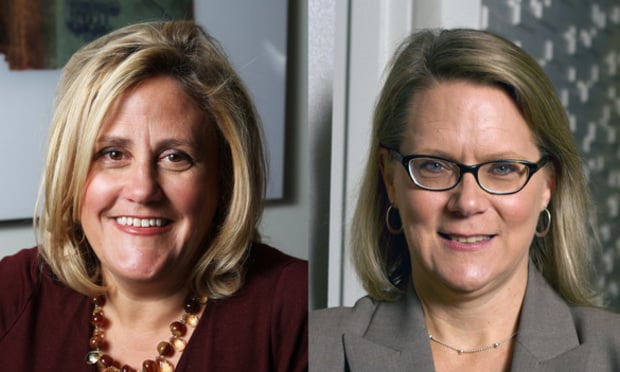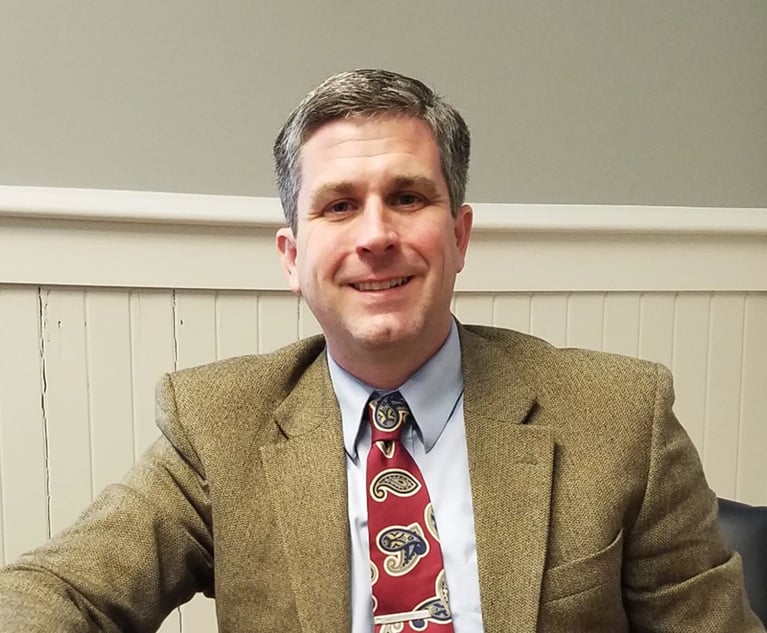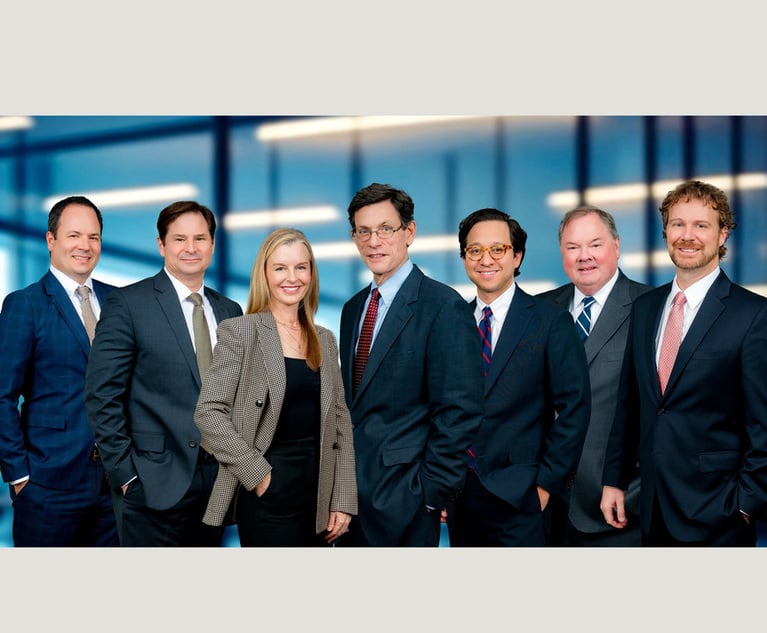When a #MeToo Story Merits a Lawsuit
Atlanta trial lawyer and legal commentator B.J. Bernstein has produced a 30-minute podcast about the challenges of turning #MeToo disclosures into lawsuits.
March 07, 2018 at 02:11 PM
3 minute read
 B.J. Bernstein (left) and Cheryl Legare of Legare Attwood & Wolfe
B.J. Bernstein (left) and Cheryl Legare of Legare Attwood & Wolfe
For all the revelations of once-secret workplace sexual harassment and assault that the #MeToo movement has uncovered, turning those into winnable lawsuits is another story.
Atlanta trial lawyer and legal commentator B.J. Bernstein has produced a 30-minute podcast about how she believes it can be done. In “Law Talk with B.J.,” Bernstein invited one of her own “go-to” employment lawyers—Cheryl Legare of Legare Attwood & Wolfe—to answer questions about which #MeToo disclosures to pursue legally.
Legare said the first question she asks new or prospective clients is, “When?”
When was the last time this happened? If this was a long-ago trauma just disclosed, then truth-telling alone might be the extent of the value. These charges, like other workplace grievances, typically start as complaints to the U.S. Equal Employment Opportunity Commission. The statute of limitations varies from 180 days to 300 days, depending on the state, Legare said.
Legare said she encourages pursuance of criminal charges where warranted. “The civil angle is harder to prove,” she said.
She said she sees more workplace sexual harassment complaints coming from smaller companies, both urban and rural. But all companies should think hard about after-hours events and travel junkets where alcohol flows freely. “Nothing good happens after 5,” Legare said.
Even if a sexual harassment claim does have a legal path forward, sometimes the lawyer or the client should rule them out because of the personal toll. “Litigation is not easy,” Legare said. “Sometimes I have to tell people, 'I'm not sure you can handle litigation or that it's not good for you.'”
People often are surprised to learn that their own personal medical, psychiatric and financial records can become public as part of the process. Also, they find that having filed a lawsuit can hurt their chances of finding other jobs. The complaint becomes a public record and likely the first item that shows up on a Google search. Legare said she has had clients who couldn't find another job in their field because potential employers were scared off by a prior lawsuit.
“I encourage people to take some time and think about it,” Legare said.
Bernstein noted that, even with the challenges, Legare has had success stories with such lawsuits.
“We are at a time of rebirth and renewal of justice in the workplace,” Bernstein said.
She noted that the 30-minute podcasts—all over a cup of tea—allow her more time to explore litigation and social issues than her regular three-minute spots as a television legal commentator.
This content has been archived. It is available through our partners, LexisNexis® and Bloomberg Law.
To view this content, please continue to their sites.
Not a Lexis Subscriber?
Subscribe Now
Not a Bloomberg Law Subscriber?
Subscribe Now
NOT FOR REPRINT
© 2025 ALM Global, LLC, All Rights Reserved. Request academic re-use from www.copyright.com. All other uses, submit a request to [email protected]. For more information visit Asset & Logo Licensing.
You Might Like
View All
On The Move: Squire Patton Boggs, Akerman Among Four Firms Adding Atlanta Partners
7 minute read

Justice 'Weaponization Working Group' Will Examine Officials Who Investigated Trump, US AG Bondi Says

Trending Stories
Who Got The Work
J. Brugh Lower of Gibbons has entered an appearance for industrial equipment supplier Devco Corporation in a pending trademark infringement lawsuit. The suit, accusing the defendant of selling knock-off Graco products, was filed Dec. 18 in New Jersey District Court by Rivkin Radler on behalf of Graco Inc. and Graco Minnesota. The case, assigned to U.S. District Judge Zahid N. Quraishi, is 3:24-cv-11294, Graco Inc. et al v. Devco Corporation.
Who Got The Work
Rebecca Maller-Stein and Kent A. Yalowitz of Arnold & Porter Kaye Scholer have entered their appearances for Hanaco Venture Capital and its executives, Lior Prosor and David Frankel, in a pending securities lawsuit. The action, filed on Dec. 24 in New York Southern District Court by Zell, Aron & Co. on behalf of Goldeneye Advisors, accuses the defendants of negligently and fraudulently managing the plaintiff's $1 million investment. The case, assigned to U.S. District Judge Vernon S. Broderick, is 1:24-cv-09918, Goldeneye Advisors, LLC v. Hanaco Venture Capital, Ltd. et al.
Who Got The Work
Attorneys from A&O Shearman has stepped in as defense counsel for Toronto-Dominion Bank and other defendants in a pending securities class action. The suit, filed Dec. 11 in New York Southern District Court by Bleichmar Fonti & Auld, accuses the defendants of concealing the bank's 'pervasive' deficiencies in regards to its compliance with the Bank Secrecy Act and the quality of its anti-money laundering controls. The case, assigned to U.S. District Judge Arun Subramanian, is 1:24-cv-09445, Gonzalez v. The Toronto-Dominion Bank et al.
Who Got The Work
Crown Castle International, a Pennsylvania company providing shared communications infrastructure, has turned to Luke D. Wolf of Gordon Rees Scully Mansukhani to fend off a pending breach-of-contract lawsuit. The court action, filed Nov. 25 in Michigan Eastern District Court by Hooper Hathaway PC on behalf of The Town Residences LLC, accuses Crown Castle of failing to transfer approximately $30,000 in utility payments from T-Mobile in breach of a roof-top lease and assignment agreement. The case, assigned to U.S. District Judge Susan K. Declercq, is 2:24-cv-13131, The Town Residences LLC v. T-Mobile US, Inc. et al.
Who Got The Work
Wilfred P. Coronato and Daniel M. Schwartz of McCarter & English have stepped in as defense counsel to Electrolux Home Products Inc. in a pending product liability lawsuit. The court action, filed Nov. 26 in New York Eastern District Court by Poulos Lopiccolo PC and Nagel Rice LLP on behalf of David Stern, alleges that the defendant's refrigerators’ drawers and shelving repeatedly break and fall apart within months after purchase. The case, assigned to U.S. District Judge Joan M. Azrack, is 2:24-cv-08204, Stern v. Electrolux Home Products, Inc.
Featured Firms
Law Offices of Gary Martin Hays & Associates, P.C.
(470) 294-1674
Law Offices of Mark E. Salomone
(857) 444-6468
Smith & Hassler
(713) 739-1250






